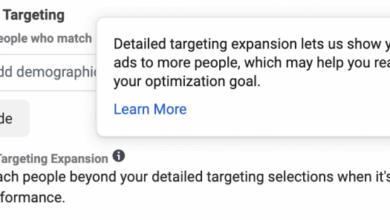Looking to improve your WordPress SEO? You’re not alone.
Search engine optimization is one of the most critical strategies for driving long-term, organic traffic to your website. Whether you’re running a blog, an eCommerce store, or a service-based site, SEO impacts everything from visibility to conversions. And with 93% of online experiences starting with a search engine—and over 75% of users never scrolling past the first page—ranking well in search results has never been more important.
Fortunately, WordPress users have a major advantage: plugins. There’s a powerful ecosystem of SEO plugins that can help you optimize every corner of your site—from keywords and post content to page speed, schema, image tags, internal linking, and more. But no single plugin does it all. The right combination of tools depends on your goals, content strategy, and technical needs.
In this post, I’ll break down the best free and premium SEO plugins for WordPress—tools I’ve tested, used, and trusted to help improve blog post performance and boost site-wide rankings. Whether you’re just getting started or looking to upgrade your SEO stack, these plugins will help ensure your helpful content gets seen, clicked, and ranked. Here’s a preview of what I will cover:
✅ SEO Plugin Comparison Table
| Plugin | Best For | Key Features | Free Version | Starting Price | Download |
|---|---|---|---|---|---|
| Yoast SEO | Bloggers, publishers, beginners | Readability analysis, meta tags, XML sitemap | ✅ | $99/year | Get Yoast |
| Rank Math | Advanced users, AI content creators | Content AI, schema, Google integration | ✅ | $59/year | Get Rank Math |
| All in One SEO (AIOSEO) | Businesses, WooCommerce sites | Local SEO, link assistant, SEO analysis | ✅ | $49.60/year | Get AIOSEO |
| SEOPress | Agencies, developers | White label, content analysis, schema | ✅ | $49/year | Get SEOPress |
| The SEO Framework | Privacy-focused sites, minimalists | Preconfigured SEO, no tracking, fast performance | ✅ | $84/year | Get The SEO Framework |
| Squirrly SEO | Non-technical users, AI-guided SEO | Live assistant, audits, keyword research | ✅ | $71.99/month | Get Squirrly |
| SEO SIMPLE PACK | Beginners, minimalist sites | Clean UI, basic meta tags, fast setup | ✅ | Free | Get SEO SIMPLE PACK |
| SEMrush SEO Writing Assistant | Content marketers, copywriters | Real-time content scoring, tone/style checks | ✅ | $129.95/month | Get SEMrush Assistant |
| Link Whisper | Bloggers, content-heavy sites | Internal link suggestions, orphaned post finder | ✅ | $77/year | Get Link Whisper |
| Schema Pro | Advanced schema, rich snippets | Custom schema types, automation | ❌ | $79/year | Get Schema Pro |
| MonsterInsights | Analytics-focused users | GA4 integration, events, affiliate tracking | ✅ | $99.50/year | Get MonsterInsights |
| Google Site Kit | Site owners, small business | Connects GA, GSC, AdSense, PageSpeed | ✅ | Free | Get Site Kit |
| WP Rocket | Speed optimization, performance | Page caching, preload, lazyload | ❌ | $59/year | Get WP Rocket |
| LiteSpeed Cache | LiteSpeed hosting users | Server-level caching, image/webP optimization | ✅ | Free | Get LiteSpeed Cache |
| Redirection | 404 fixes, simple site migrations | 301/302 redirects, 404 tracking | ✅ | Free | Get Redirection |
Further Reading: The 16 Best WordPress Plugins for Business Blogs in 2025 (and 12 Other Plugins to Consider)
Do You Really Need an SEO Plugin for WordPress?
Yes — even though WordPress is a relatively SEO-friendly CMS out of the box, it lacks critical features for full on-page optimization. That’s where SEO plugins come in.
By default, WordPress doesn’t let you easily edit meta titles or meta descriptions — both essential for getting clicks from search engines. SEO plugins make this easy, while also helping you:
- Create optimized XML sitemaps
- Improve content readability
- Add structured data (schema)
- Manage redirects and 404 errors
- Integrate with tools like Google Search Console and SEMrush
If you want to compete in search rankings — especially in competitive niches like eCommerce, blogging, or services — a plugin is essential.
Whether you’re a beginner looking to optimize posts with a few clicks, or an advanced user needing schema and link audits, there’s a tool on this list that fits your goals.
Expert Tip: I’ve tested dozens of SEO plugins across client projects and my own site. Some, like Yoast or Rank Math, are great all-rounders. Others, like Link Whisper or Schema Pro, fill specific technical gaps. The key is picking the right combination based on your goals.
Further Reading: The 17 Most Useful WordPress Tips and Tricks to Blog Like a Pro!
The 15 Best SEO Plugins for WordPress
With all of that said, let’s take a look at your SEO plugin options, from built-in to third-party SEO tools. These are chosen for their high quality and, in some cases, specialized functionality that can benefit certain types of businesses or websites. For instance, some specialize in technical fields and offer more advanced webmaster tools like redirect managers and automation features, where your potential audience has specific things they’re looking for or your site is large enough to warrant advanced features and a premium plugin over basic SEO features.
All-in-One WordPress SEO Plugins
Best for site owners looking for comprehensive, beginner-friendly SEO management in one place.
1. Yoast SEO
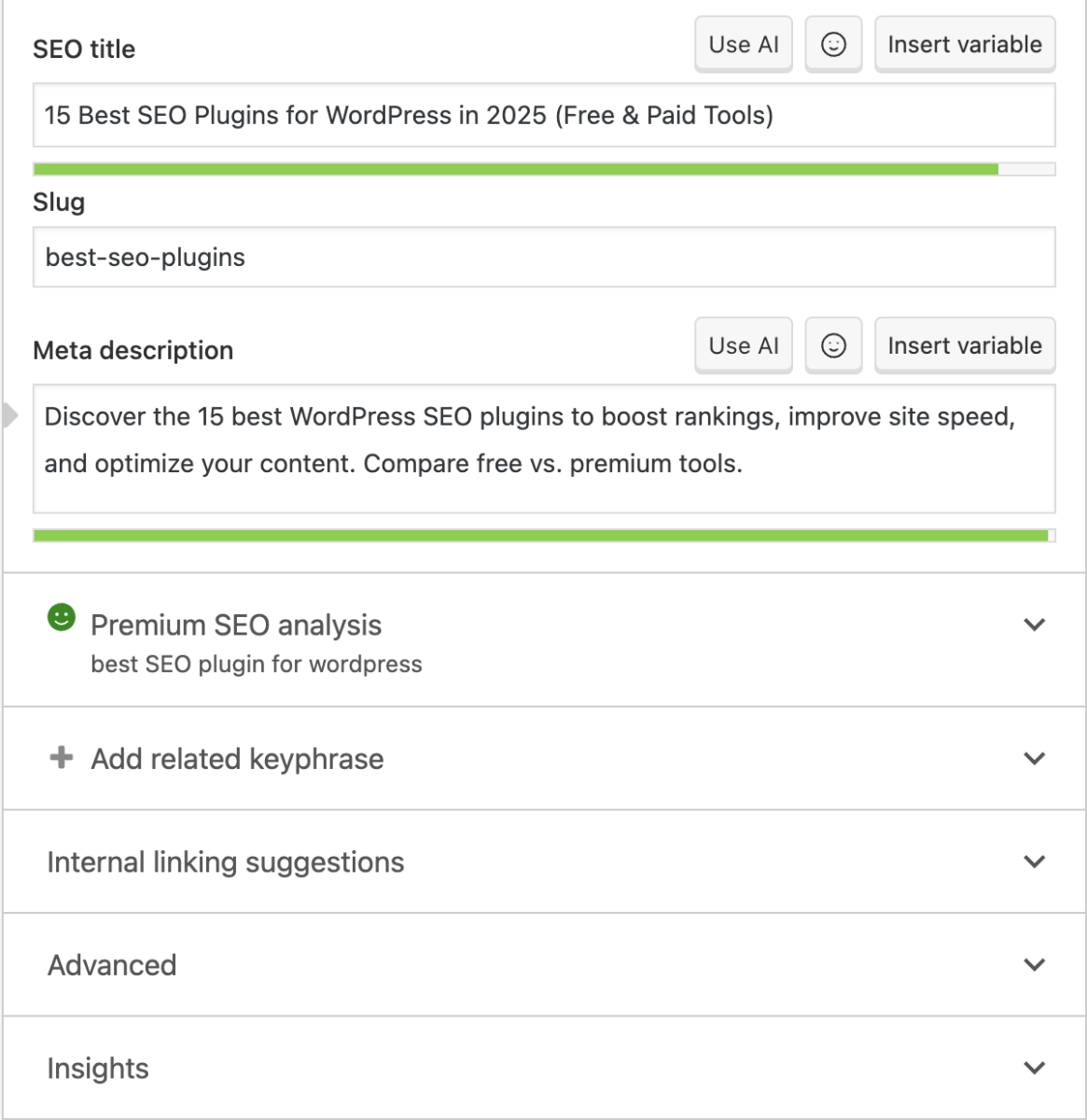
Yoast SEO is among the most popular SEO plugins for a reason, and I have been a faithful Yoast SEO user for more than a decade. Going beyond simply telling you how you’re performing on search engines, Yoast SEO gives you suggestions for improvement and the structured data to back it up. And, the plugin works for more than just plain text: some versions include video, social media functionalities, and more. Even the most basic version gives you suggestions to backlink like a pro. They’ll even kill dead links for you. Do note that there are free and several paid or premium versions, so be sure to pick the right one for you.
Best for: Beginner bloggers, content marketers, and WordPress site owners who want intuitive on-page optimization.
Use case: If you want an easy way to manage titles, meta descriptions, and readability across all posts — all with real-time SEO feedback.
✔️ Pros:
- Time-tested with over a decade of development
- Real-time SEO and readability analysis
- Strong content optimization tools (meta tags, schema, breadcrumbs)
- Great documentation and support community
- Built-in redirect manager in premium version
❌ Cons:
- Can feel bloated with too many prompts for beginners
- Premium version needed for full feature set (e.g., multiple focus keywords)
- Traffic light system can sometimes lead to over-optimization
2. Rank Math
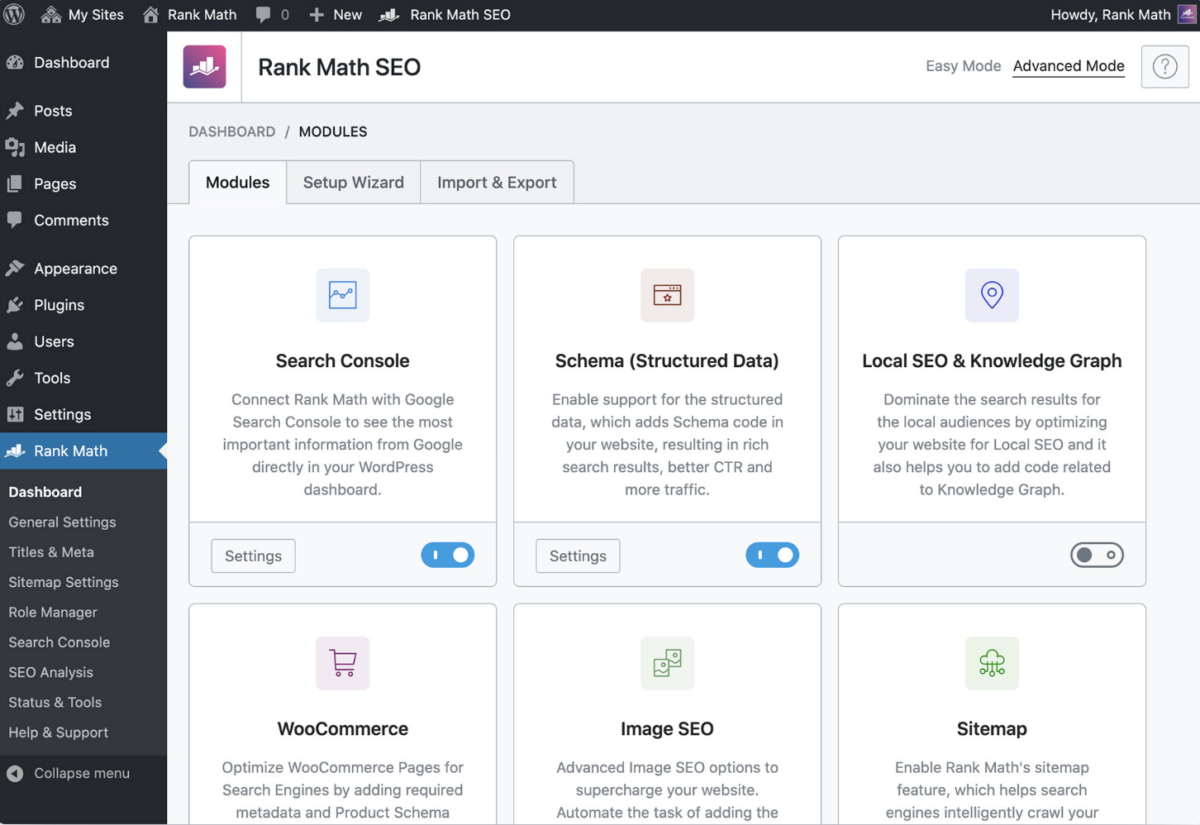

This plugin has a few notable features. For instance, the tool is fully integrated with multiple social networks, including Pinterest and LinkedIn. This lets you take much of the guesswork out of your social media SEO. In addition, Rank Math uses an easily readable interface that lets you turn on only what you need to receive actionable insights alone, without any additional fluff.
Best for: Power users, affiliate marketers, and SEOs looking for advanced features like schema, AI optimization, and keyword / keyphrase tracking.
Is Your LinkedIn Working?
Just released: my new book to help professionals, entrepreneurs, and business owners maximize LinkedIn for real growth.
With years of LinkedIn expertise, Maximizing LinkedIn for Business Growth offers actionable steps to build your brand, expand your network, and drive results.
Start leveraging LinkedIn like never before—grab your copy now! Click the cover or button below to buy on Amazon.


Use case: If you want an all-in-one solution with unlimited keyword optimization, AI-powered content suggestions, and deep Google integrations — all in a free plugin.
✔️ Pros:
- Extremely feature-rich even in the free version
- AI-powered Content Assistant helps optimize content intelligently
- Allows unlimited keywords (vs. Yoast’s one)
- Easy setup wizard and modular structure
- Seamless integration with Google tools and page builders
❌ Cons:
- So many features may overwhelm beginners
- Content AI credits can run out quickly on lower-tier plans
- More frequent updates can cause compatibility quirks
3. All in One SEO for WordPress (AIOSEO)
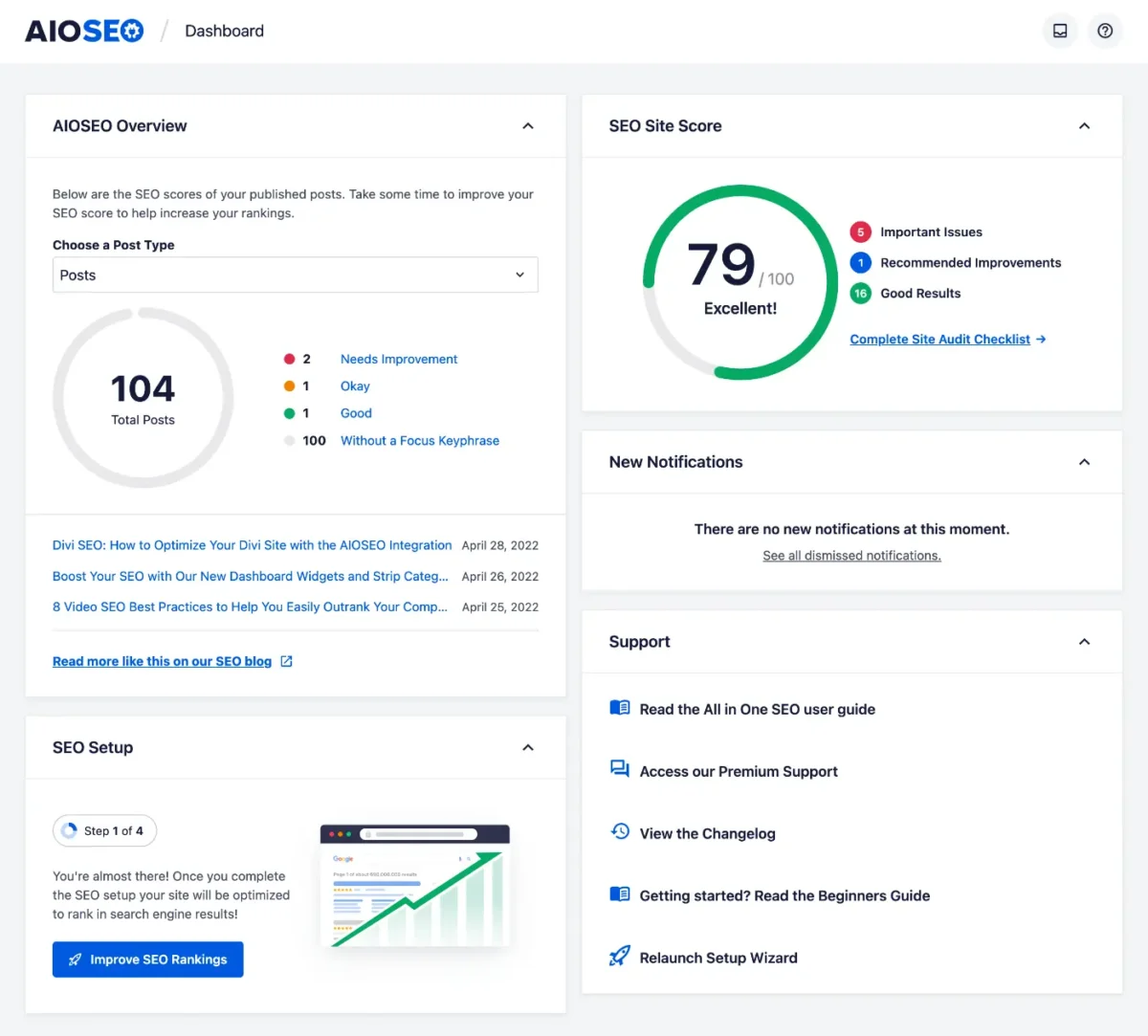

With AIOSEO, you get a lot of tools in one easy-to-use user-friendly plugin. For instance, you get support for video, local SEO, and Google news in one tool. As an added bonus, you get on-page analytics and suggestions for improvement. By contrast, some of the other best SEO plugins for WordPress require you to install these tools separately. However, perhaps the most compelling feature is the ability to control access for different users, making team blog management a snap. While this is not necessarily a valuable tool to improve search rankings, it can be particularly useful for advanced users.
Best for: Small businesses, WooCommerce store owners, and teams managing multiple contributors.
Use case: If you need a plugin that handles local SEO, video SEO, and Google News — while also offering user role access control for SEO settings.
✔️ Pros:
- Comprehensive feature set for on-page, local, and WooCommerce SEO
- TruSEO score offers actionable optimization guidance
- Built-in schema, sitemap, and social media tools
- Great integration with Google Search Console and ChatGPT
- Excellent for teams and role-based access
❌ Cons:
- Slower to implement new SEO trends compared to others
- Some UX elements feel dated compared to Rank Math
- Many features locked behind higher-tier plans
4. SEOPress
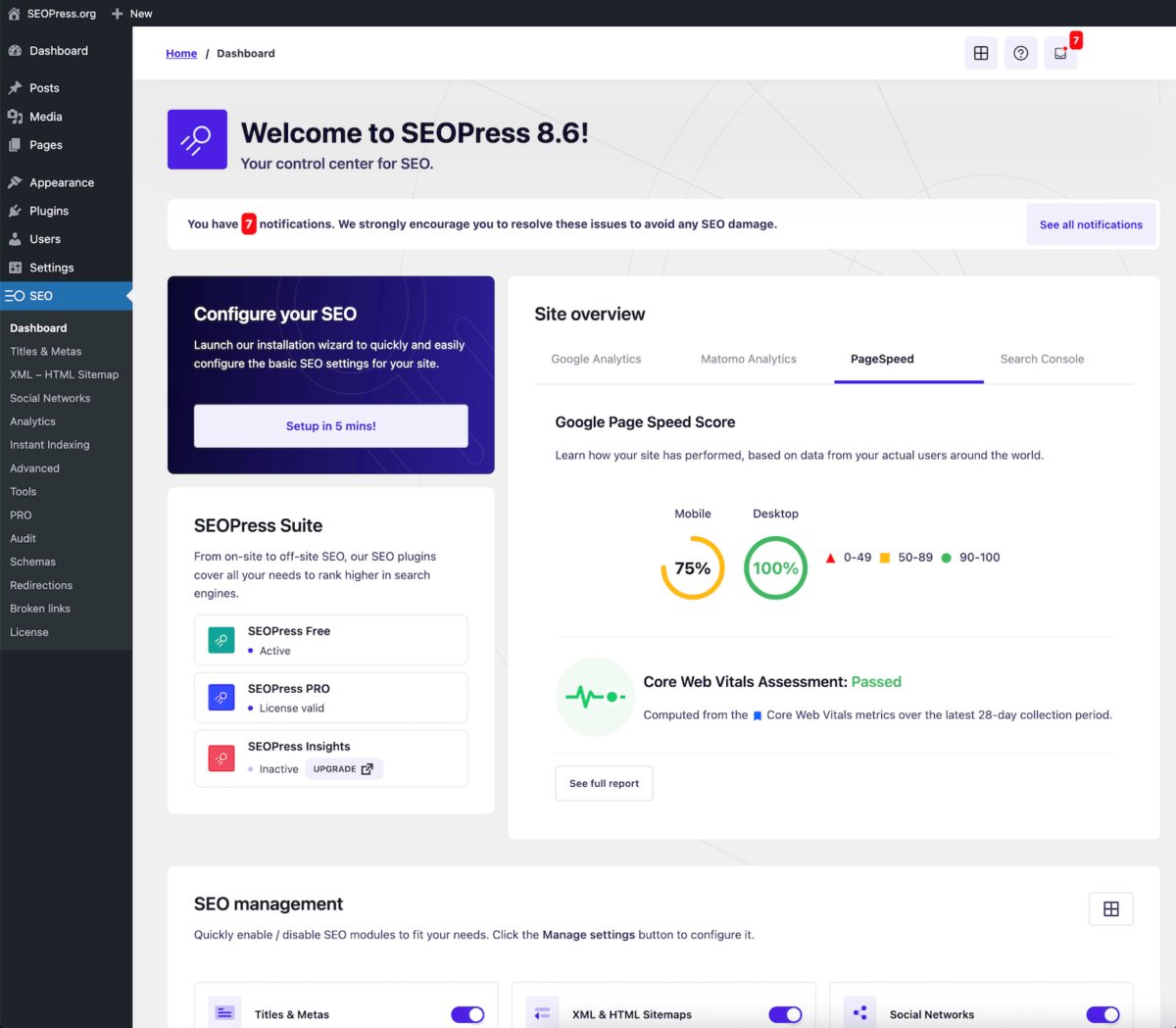

If you run a marketing or SEO agency, then this is among the best SEO plugins for WordPress. That’s because they offer a white label solution that lets you put your company name on their product. Best of all, this is available even on the free version. For everyone else, the image SEO features are excellent.
Best for: Agencies, developers, and white-label SEO providers.
Use case: If you’re managing multiple client sites and want a white-label SEO plugin with advanced schema, XML/HTML sitemaps, and no ads.
✔️ Pros:
- White-label option (even in free version) ideal for agencies
- Simple interface with powerful developer hooks
- Affordable Pro version with unlimited sites
- Excellent WooCommerce support
- Ad-free and lightweight
❌ Cons:
- Smaller community compared to Yoast or Rank Math
- Some advanced features (e.g., breadcrumbs, redirections) require Pro
- Less handholding or automation for beginners
5. The SEO Framework
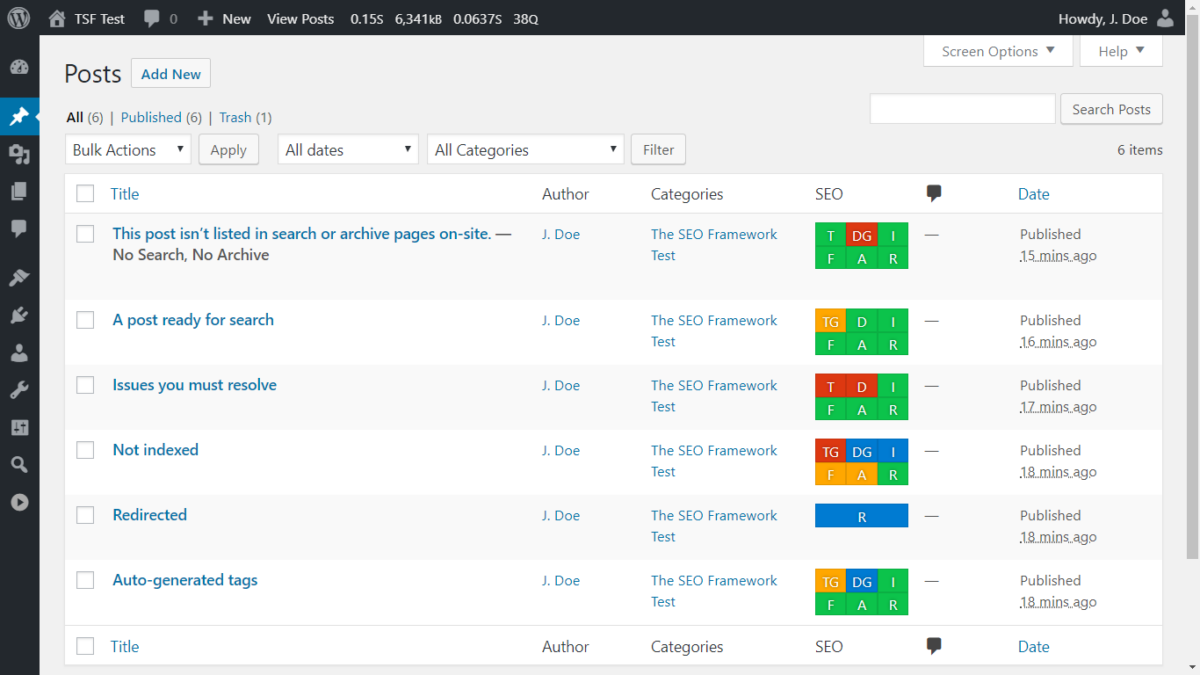

The SEO Framework has two basic selling points. First, they claim to be the most ethical SEO plugin out there, using only white hat techniques and foregoing customer tracking. This means that they are the best if you need a high level of privacy protection. Second, this is among the best SEO plugins for WordPress when you and your clients need high security. If you run a site where this is potentially an issue, often due to the types of content with sensitive subject matter or business practices, check it out.
Best for: Privacy-conscious users, minimalist developers, and sites needing clean, ethical SEO without tracking.
Use case: If you want a pre-configured SEO plugin that runs fast, avoids telemetry, and respects GDPR out of the box.
✔️ Pros:
- Privacy-focused and lightweight
- Automatically optimized settings out of the box
- Color-coded SEO indicators for quick status checks
- No ads, upsells, or branding in the interface
- Ideal for technical SEO purists
❌ Cons:
- Interface may feel minimalist for some users
- Fewer features for content creators (e.g., no readability analysis)
- Smaller user community and third-party integrations
6. Squirrly SEO
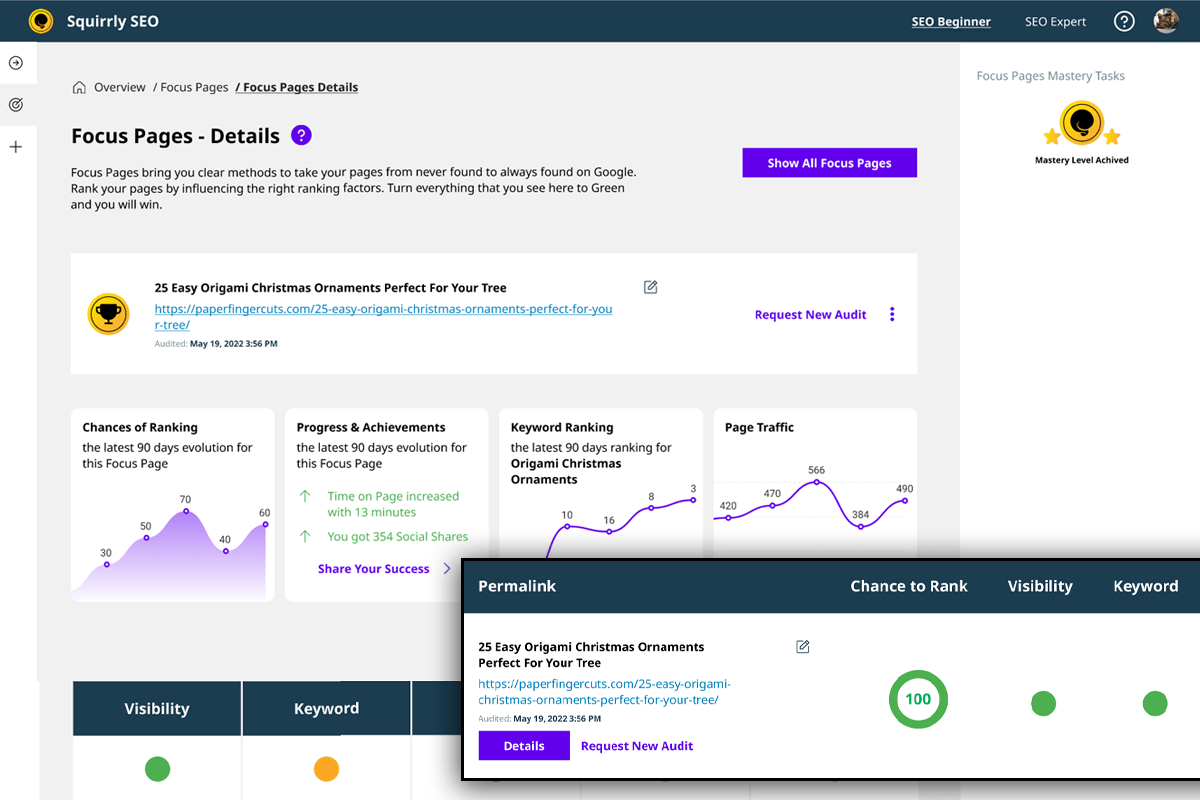

Squirrly SEO is great because it is driven by the latest AI technology. It is designed specifically for small business owners who don’t have a lot of time to learn SEO or run their websites. The developers also claim that it takes the guesswork out of good performance and provides a “paint by number” approach to creating SEO-friendly content.
Best for: Non-technical users, solopreneurs, and small businesses who want SEO guidance without a learning curve.
Use case: If you want AI-driven, real-time SEO instructions while writing — especially if you’re overwhelmed by traditional SEO tools.
✔️ Pros:
- Designed for non-technical users with real-time SEO guidance
- Helpful 14-day action plan for improving rankings
- Built-in keyword research and competitor benchmarking
- Great for beginner bloggers or solopreneurs
❌ Cons:
- Many core features gated behind premium tiers
- Interface can be cluttered and complex to learn
- Feature overload — some feel unnecessary
7. SEO SIMPLE PACK
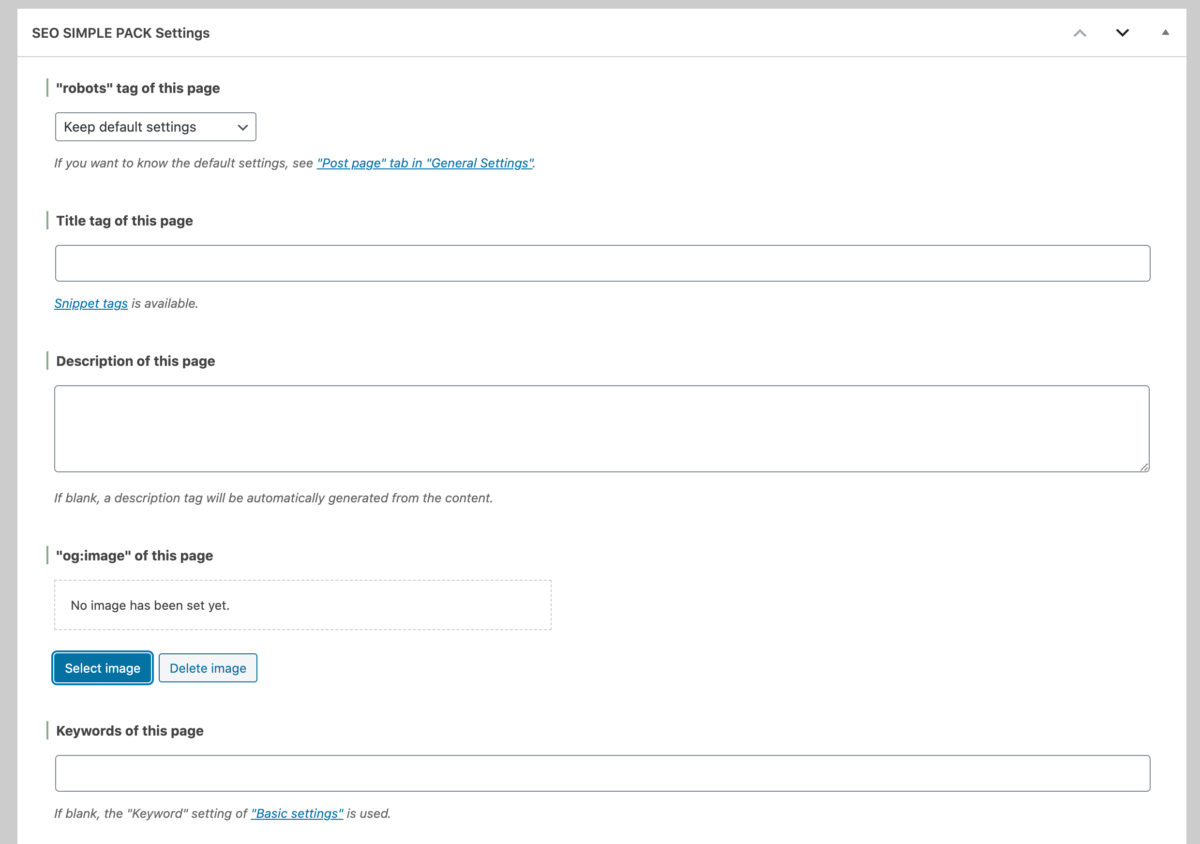

If you’re looking for a no-frills, beginner-friendly SEO plugin that does exactly what it promises, SEO SIMPLE PACK is a hidden gem. Developed with simplicity and speed in mind, this lightweight tool lets you easily manage meta titles (SEO titles) and descriptions without overwhelming you with settings. While it lacks some of the advanced features found in larger plugins, that’s precisely the point—it gets out of your way and lets you focus on writing. Ideal for bloggers and content creators who just want clean, essential SEO without the bloat.
Best for: Beginners in Japan (as it was developed there with full Japanese documentation) or anyone who wants a simple, lightweight SEO solution without the bloat.
Use case: If you just need clean title/meta settings and schema support without the overwhelm of a full-featured suite.
✔️ Pros:
- Extremely lightweight — ideal for minimalist installs
- Simple setup and clean UI
- Handles the SEO essentials without bloat
- Great for Japanese language users (primary development market)
❌ Cons:
- Limited feature set (no schema, redirect manager, breadcrumbs)
- No support for advanced integrations
- Smaller dev team and user base outside Japan
Further Reading: Blogging for Beginners Tips: 5 Things I Wish I Knew BEFORE Starting a WordPress Blog!
Content Optimization & Writing Assistants
Perfect for improving individual post/page SEO with keyword suggestions, internal links, and structured data.
8. SEMrush SEO Writing Assistant
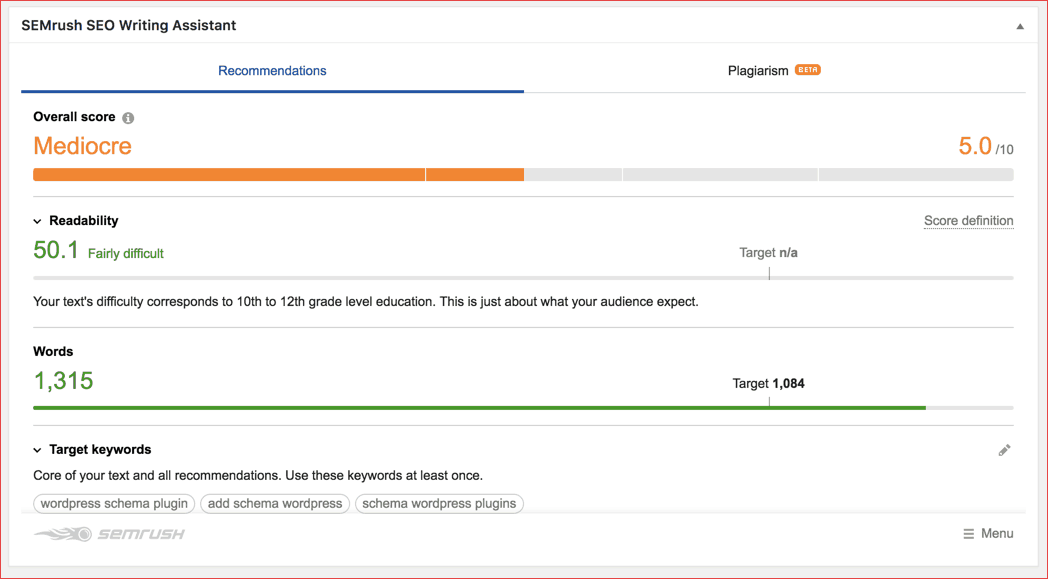

If you already use SEMrush for your online marketing needs, then check out the writing assistant. It helps you compose content that’s immediately competitive on search engines without having to adjust SEO settings or identify your own content insights. In addition, there’s a version that is added to Google Docs. This means you can use already free software for word processing and enjoy the benefits of the writing assistant. Finally, take comfort with their free plagiarism checker that can help even the most experienced users.
Best for: Content marketers, SEO writers, and editorial teams focused on data-backed content performance.
Use case: If you want to optimize content directly in WordPress using real-time keyword, readability, and SEO suggestions based on top-ranking content.
✔️ Pros:
- Real-time SEO scoring and readability checks
- Integrates SEMrush keyword research directly into WordPress
- Offers tone of voice, originality, and structure suggestions
- Great for content marketers writing to rank
❌ Cons:
- Better suited for editorial teams than technical SEOs
- Requires SEMrush subscription (can be expensive)
- Primarily a writing assistant — not a full SEO plugin
9. Link Whisper
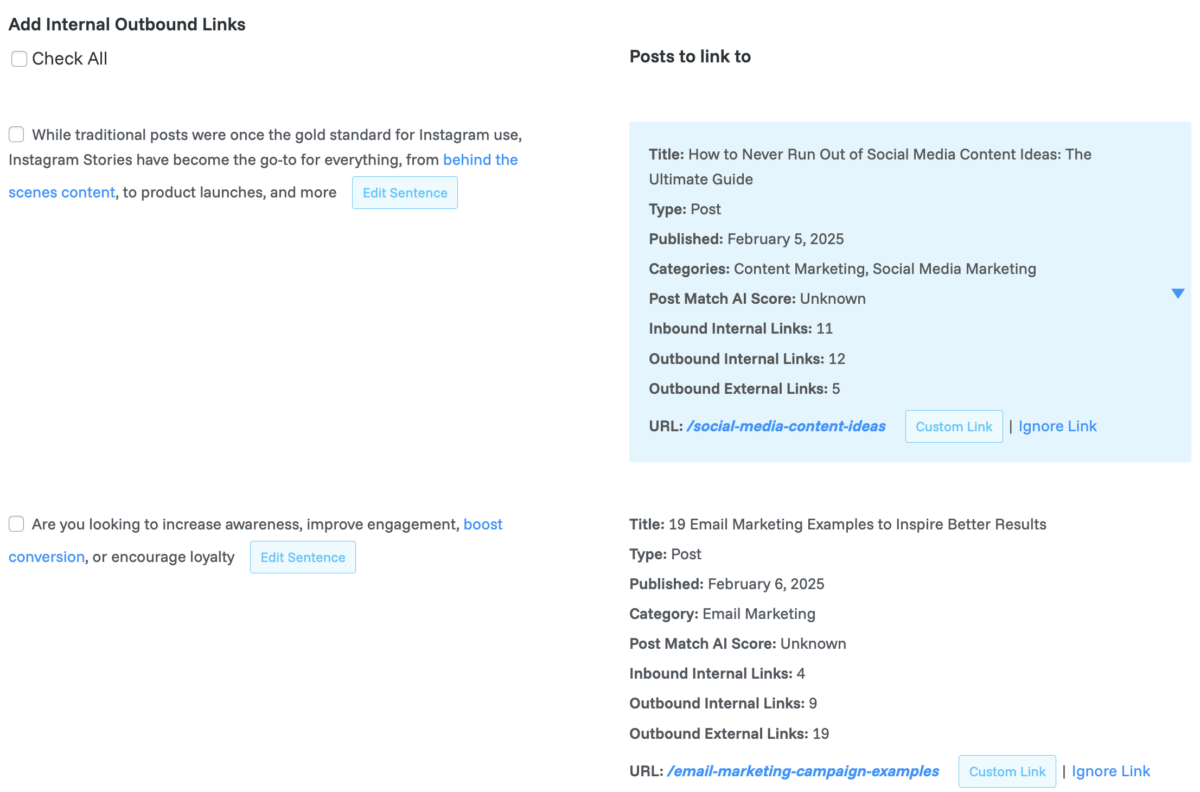

I’ve been using Link Whisper for several years now, and it’s become an indispensable part of my SEO workflow. One of its standout features is how effortlessly it helps you identify and fix orphaned posts—content that isn’t linked to from anywhere else on your site. With just a few clicks, you can build strategic internal links that boost your SEO and improve user experience. What I especially love is its integration with ChatGPT, which provides intelligent link suggestions that actually make sense contextually. Whether you’re managing a blog or a growing content library, Link Whisper turns internal linking from a tedious chore into a powerful optimization tool.
Best for: Content-heavy blogs, affiliate sites, and SEO teams needing smart internal linking and orphan content detection.
Use case: If you want to automate internal link building and identify pages with no inbound links — with optional ChatGPT suggestions.
✔️ Pros:
- Unmatched internal linking automation
- Automatically detects orphaned content
- ChatGPT integration for even smarter link suggestions
- Link reporting shows internal/external link health
❌ Cons:
- Paid plugin — free version has limited utility
- Link suggestions are not always contextually perfect
- Doesn’t handle broader SEO tasks (on-page, sitemaps, etc.)
10. Schema Pro
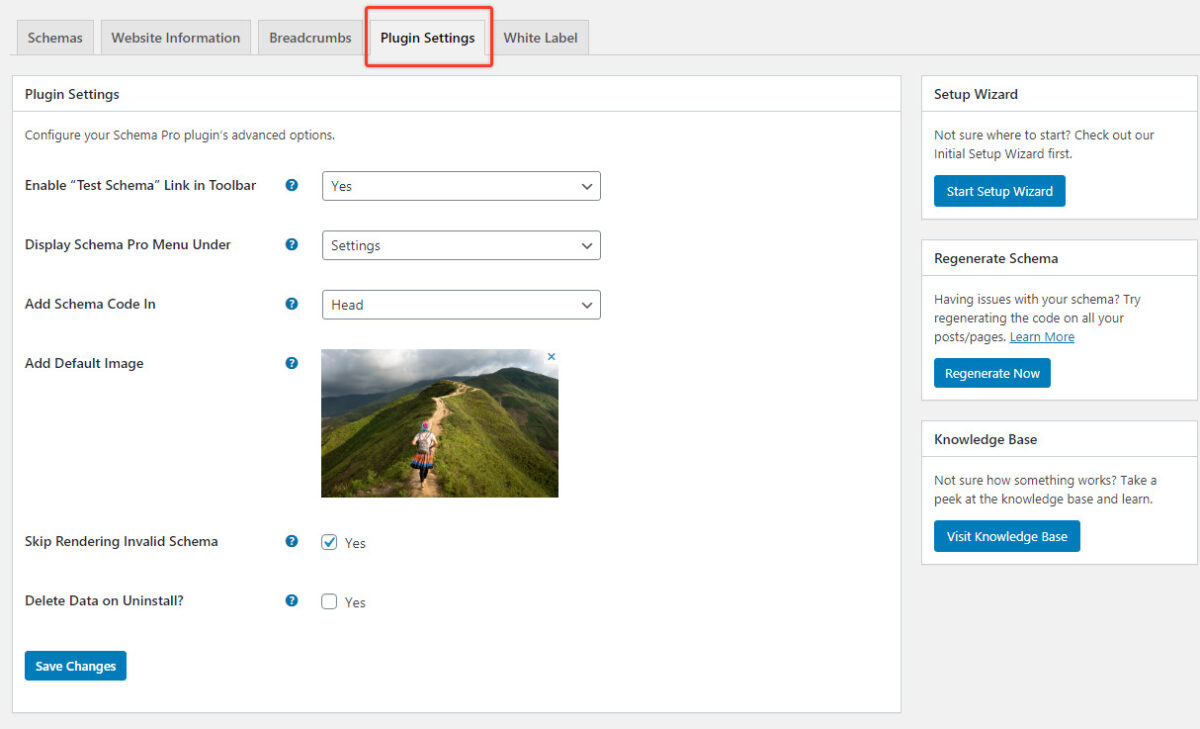

This one is designed to work alongside Yoast to optimize a specific type of website. So, if you have an eCommerce site then Schema Pro will optimize with that in mind. Once it’s set up, the plugin essentially runs on autopilot.
This one is designed to work alongside Yoast SEO to optimize a specific type of website. So, if you have an eCommerce site, then Schema Pro will optimize with that in mind. Once it’s set up, the plugin essentially runs on autopilot to deliver the schema markup that will most effectively index you appropriately according to your keyword rankings.
Best for: Technical SEOs, developers, and business owners needing rich snippets for reviews, FAQs, courses, and more.
Use case: If your goal is to appear in Google’s rich results with schema for multiple content types — without manual coding.
✔️ Pros:
- Comprehensive support for multiple schema types (FAQs, recipes, etc.)
- Automates structured data across your whole site
- Easy visual mapping interface for custom fields
- Great for enhancing SERP visibility with rich snippets
❌ Cons:
- Limited ongoing development compared to competitors
- Doesn’t include other SEO features (needs to be used alongside another plugin)
- No free version
SEO Analytics & Performance Monitoring
Ideal for tracking SEO success, SEO rankings, user behavior, and performance metrics inside WordPress.
11. MonsterInsights


This one has an incredible advantage for any company that does business in Europe, even if it’s just selling digital products. Specifically, MonsterInsights gives you information about your audience while also being compliant with EU data protection standards. In addition, this plugin has dedicated eCommerce functionality, which is a handy tool for anyone with an online store.
Best for: Marketers, WooCommerce stores, and business owners who need simplified Google Analytics reporting.
Use case: If you want to track SEO performance, top pages, and conversions directly inside your WordPress dashboard — without touching code.
✔️ Pros:
- Simplifies Google Analytics setup and reporting
- Beautiful dashboard with real-time data
- Includes eCommerce and form conversion tracking
- Extremely beginner-friendly
❌ Cons:
- Can slow down admin area slightly on high-traffic sites
- Premium pricing for key features (eCommerce, tracking, etc.)
- Not a full SEO plugin (analytics only)
12. Google Site Kit
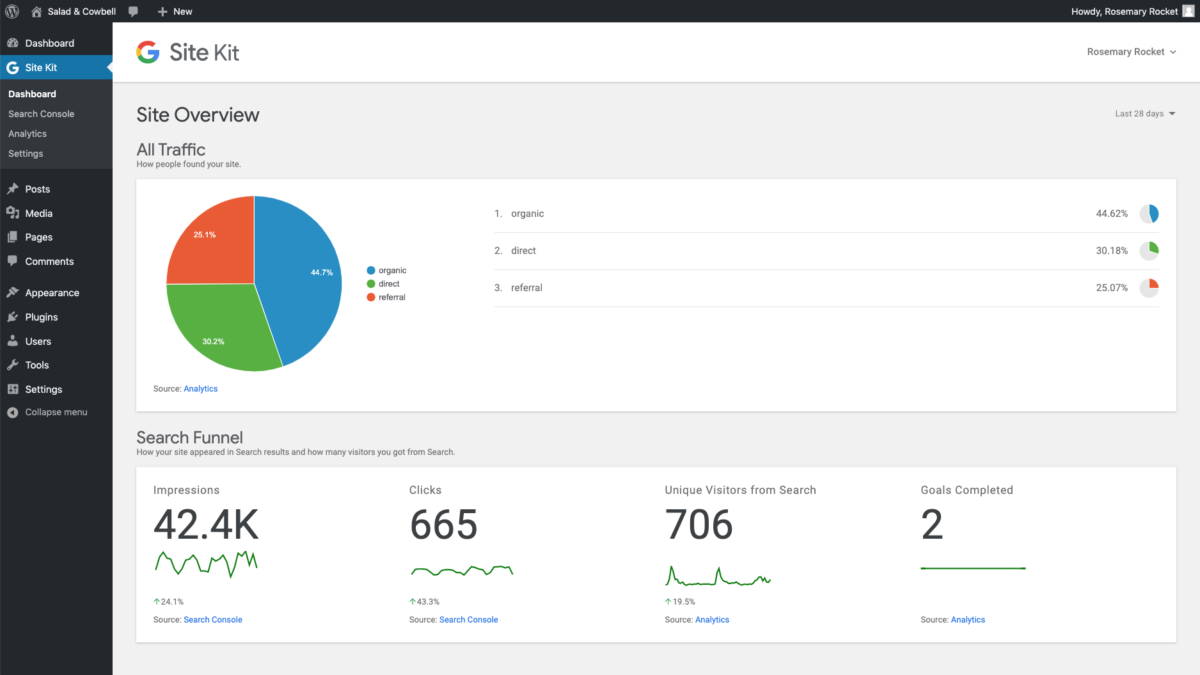

Google Site Kit is the official WordPress plugin from Google, and it’s perfect for anyone who wants an easy, streamlined way to view key SEO data without leaving the WordPress dashboard. With just a few clicks, you can connect your site to essential tools like Search Console, Google Analytics, PageSpeed Insights, AdSense, and more. I especially appreciate how it brings all of this data together in one place, making it easy to understand how your site is performing and where there’s room for improvement. While it doesn’t offer optimization features itself, it’s one of the best plugins for monitoring and measuring the results of your SEO efforts.
Best for: Site owners and DIY marketers who want an official, Google-backed dashboard with all major tools.
Use case: If you want to connect Search Console, Analytics, AdSense, and PageSpeed Insights in one place — with setup handled in a few clicks.
✔️ Pros:
- Official plugin from Google — seamless integration
- Combines Search Console, Analytics, PageSpeed Insights, and AdSense
- No need to touch code for verification or setup
- Great for quick, holistic performance snapshots
❌ Cons:
- No SEO guidance or keyword research tools
- Sometimes buggy with certain hosting setups
- Doesn’t show as much actionable data as third-party analytics dashboards
Technical SEO & Site Performance Plugins
Tools to improve site speed, fix broken links, manage redirects, and optimize crawlability.
13. WP Rocket
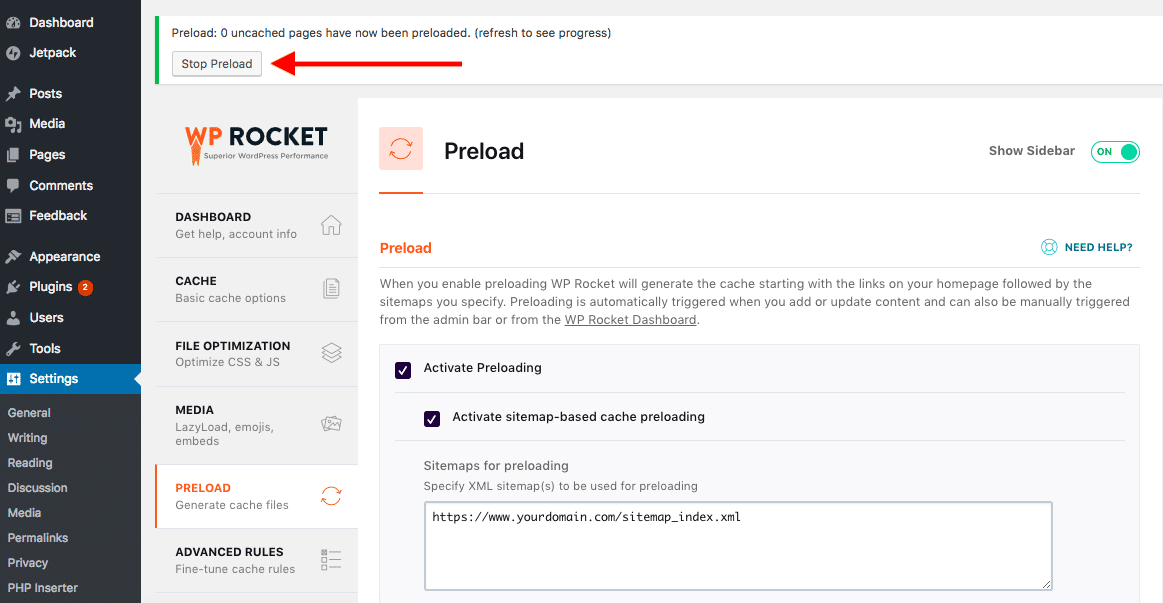

If you need a great caching plugin that also does SEO, then check out WP Rocket. The aim of WP Rocket is to improve your SEO by reducing bounce rate through improved load speeds. In addition, you can optimize the file types for multimedia and set the site to only load media files when needed. Finally, WP Rocket automatically uses best practices to ensure optimal performance for keyword rankings and more.
Best for: Anyone focused on Core Web Vitals, especially eCommerce and image-heavy sites.
Use case: If you want to speed up your site (which boosts SEO) with advanced caching, minification, lazy loading, and database optimization — no technical skills needed.
✔️ Pros:
- Best-in-class performance optimization plugin
- Page caching, file minification, and preload features included
- Easy to set up with noticeable speed boost
- Compatible with most SEO and theme plugins
❌ Cons:
- Premium only — no free version available
- Might require some fine-tuning for complex sites
- Less useful for hosts with built-in caching
14. LiteSpeed Cache
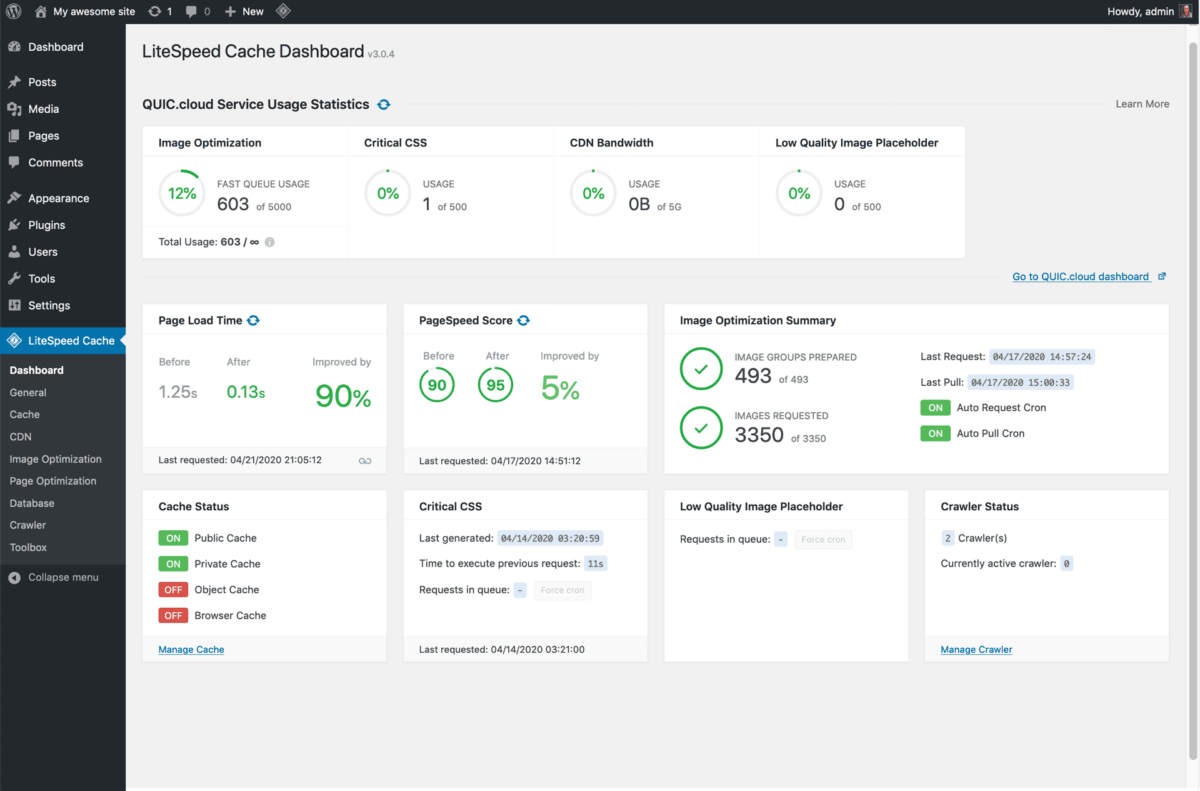

LiteSpeed Cache is one of my go-to plugins for turbocharging site speed, and as you know, performance is a critical factor in SEO. What makes LiteSpeed Cache stand out is its all-in-one optimization suite: you get powerful page caching, image optimization, database cleanup, lazy loading, and even integration with a CDN—all from a single plugin. If you’re using a LiteSpeed server, you’ll get even more performance benefits. But even on other servers, the plugin offers excellent results. It’s a must-have for keeping load times low and Core Web Vitals in check, both of which can significantly improve your search rankings.
Best for: Site owners using LiteSpeed servers, or those wanting a powerful free performance plugin.
Use case: If you’re on a LiteSpeed-powered host and want superior caching, image optimization, and CDN integration — all without needing WP Rocket.
✔️ Pros:
- Extremely powerful caching when used with LiteSpeed servers
- Includes image optimization, database cleanup, and CDN support
- Free and packed with advanced performance options
❌ Cons:
- Only fully compatible with LiteSpeed or OpenLiteSpeed hosting
- Interface not as polished as WP Rocket
- Learning curve for advanced settings
15. Redirection
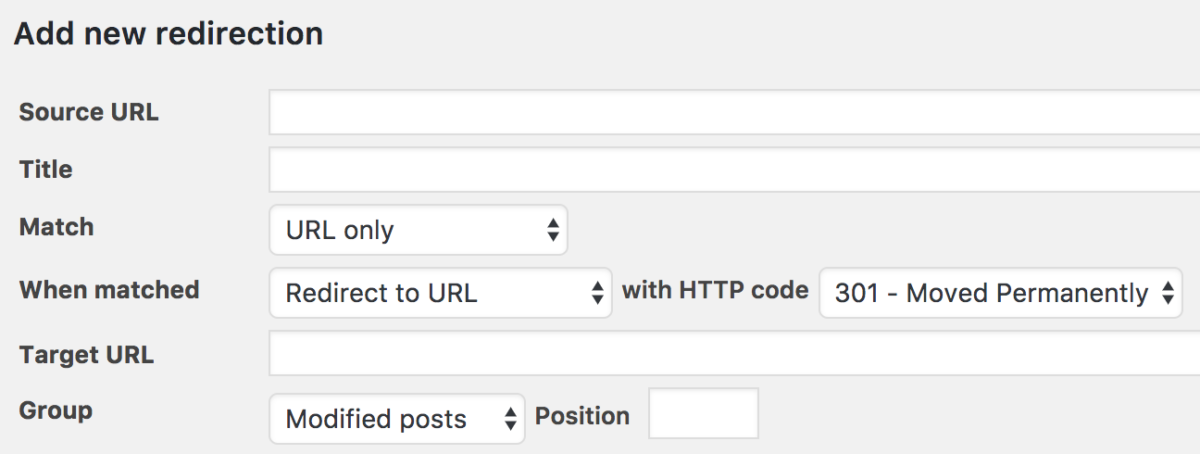

If you have a lot of redirects or 404 errors on your site, you’ll love this free plugin. Redirection is a special tool to find those errors, giving you the chance to fix them. In addition, some redirections can be done automatically by the plugin. This makes your life much easier if your site has a lot of links and is considered a plugin suitable for larger or more complicated sites. Note that I used this plugin until I subscribed to Yoast SEO Premium, which includes the same functionality, but only this plugin gives you the counts that your redirections are fired, something handy to have.
Best for: Publishers, SEOs, and marketers managing frequent URL changes, site migrations, or content pruning.
Use case: If you need a reliable way to set up 301/302 redirects, monitor 404s, and maintain SEO equity when restructuring content.
✔️ Pros:
- Industry standard for managing 301/302 redirects
- Logs every redirect and counts hits
- Easy 404 error monitoring and redirect rules
- Supports regular expressions and conditions
❌ Cons:
- Interface can feel dated
- No bulk import/export support unless done manually
- Overlaps with other plugin features (e.g., Yoast Premium redirect manager)
Final Thoughts: Choosing the Right WordPress SEO Plugins for Your Strategy
There’s no one-size-fits-all when it comes to WordPress SEO plugins. While tools like Yoast SEO have dominated the space for years, they may not be the best fit for every site. Depending on your goals—whether it’s better internal linking, faster load times, or enhanced schema support—there are other powerful plugins that might suit your needs more effectively.
The key isn’t just installing the right tools, but having a smart SEO strategy behind them. From fixing broken links and improving page speed to optimizing content and metadata, the plugins of your choice should support your long-term visibility, traffic growth, and user experience. Take the time to test what works best for your site, and remember: SEO is a long game, but the right tools make all the difference.
Further Reading: WordPress SEO: 31+ Best Practices for Improving Your Ranking
Actionable advice for your digital / content / influencer / social media marketing.
Join 13,000+ smart professionals who subscribe to my regular updates.


